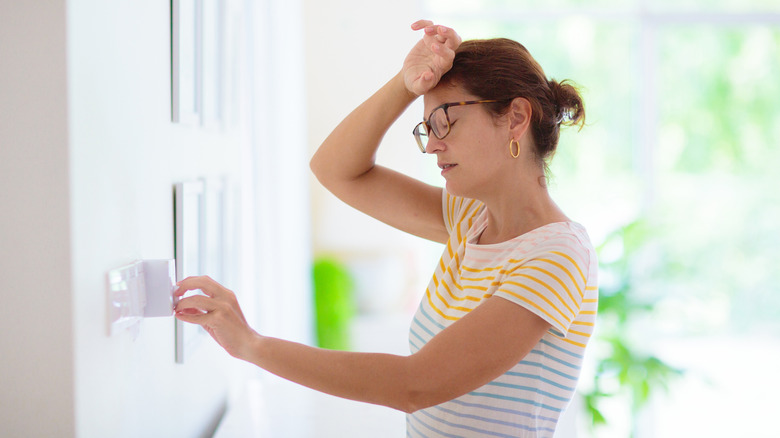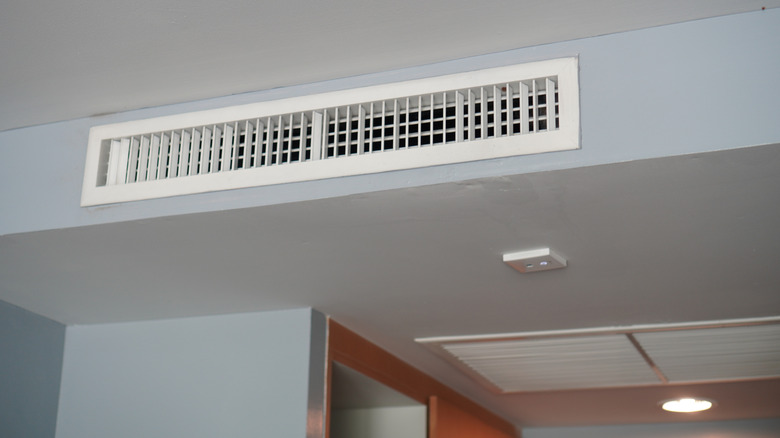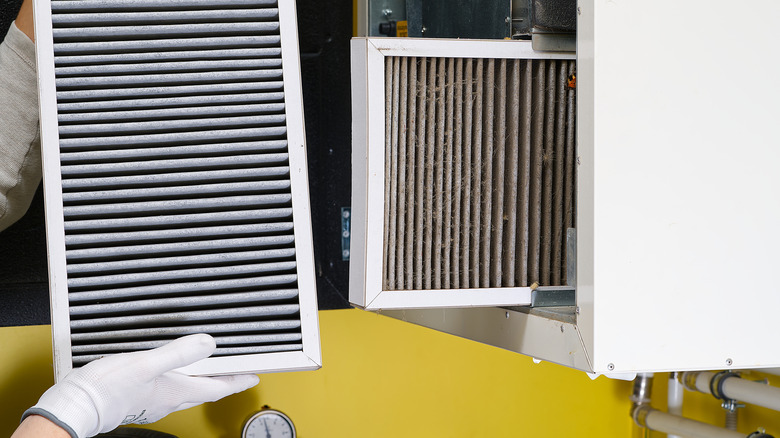Is Closing The Vents In Unused Rooms During The Summer Heat Really A Good Idea?
You know that moment during the heat of the summer when you're staring at the thermostat on the wall, wondering if 72 degrees Fahrenheit is actually reasonable or if it's time to throw caution (and your energy bill) to the wind? That moment when you hit the down arrow just one more time, praying that a blast of cool air will finally turn your living room into a sweat-free utopia instead of the most miserable spot in the house? We've all been there, wondering what else can be done to battle those scorching summer days. Although it may seem tempting to turn down the temperature and close off every single vent in the house except the one you're sitting directly below, according to Richie Drew, vice president of operations at One Hour Heating & Air Conditioning, closing the vents in your unused rooms is more likely to freeze your HVAC system's coil than you.
"While it might seem like a good idea at first to close off vents in rooms that are not being used, it can actually do more harm than good," Drew told House Digest during an exclusive interview. The issue is a technical one and involves the core mechanics of how an HVAC system works. "When a central heating and air conditioning system is installed, the air duct system is designed to match the output and input of the unit in terms of airflow," the expert explained. "If we closed off vents in rooms that were not occupied, we would disrupt the air flow of the system." And that's anything but cool.
Closing your vents can lead to damaging moisture and frost issues
"We want the air to flow evenly through the home, and we want the system to maintain the proper static pressure for the most efficient operation possible," Richie Drew said during his exclusive interview with House Digest. If you disturb this balance, you won't be the only thing sweating in your house. "Closing vents can cause air restrictions that could cause ductwork to sweat and cause moisture issues." Too much moisture is a major problem that can ruin your insulation or even cause mold growth, which is one of the ways your HVAC system can make you ill. But believe it or not, things could get even worse.
On the hottest days of the year, sitting on a block of ice may seem appealing. But it's an HVAC nightmare that's all too common when you close up all the vents in your house. "If airflow is restricted enough, the coil can become frozen, which can damage the system," Drew cautioned. If the thought of your air conditioning going on the fritz sends a chill down your spine, you'll need to do more than just leave your vents open to keep the air flow even. "The best way to ensure your system is operating at peak efficiency is to have it maintained annually to include cleaning the indoor and outdoor coils and clearing any debris or bushes that may be obstructing the coil," the expert advised. He said you should also regularly clean and clear your HVAC system's drain lines.
Replacing your air filter regularly will keep you cooler than closing your vents
No matter how tropical it gets in your house, there's never a good reason to close individual room vents while operating your air conditioner in the summer, Richie Drew told House Digest during his exclusive interview. "It is best to let the system perform as designed and to keep the equipment maintained." The expert added that the single most important thing homeowners should do when they want their air conditioning to keep things nice and cool all summer long is to change the air filter regularly. "Check your air filters every thirty days, and change them before they become too clogged with dirt and dust," he emphasized. "If they are clogged, it can cause airflow restrictions that can lead to damage to the system and even failure."
Although the process is pretty straightforward, there are some common mistakes everyone makes when buying air filters. Make sure you get the right filters for your specific unit, because using one that's the wrong size can lead to the same kind of problems as closing up your vents. Your installer can show you how to replace the filter, or you can often find a step-by-step instruction label on the unit itself. You should turn off the unit before removing and disposing of the old filter. It will be gnarly, so don't forget to wear gloves! Then, wipe away any dust or debris before setting the new filter in place. Keep an eye out for any suspiciously worn-looking seals or gaskets, replacing them if necessary. If you spot moisture, mold, or frost, call your local HVAC expert for help.


